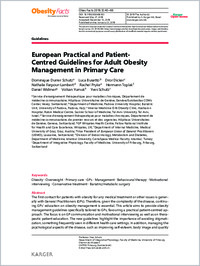European practical and patient-centred guidelines for adult obesity management in primary care
- Durrer Schutz, D. Service d’enseignement thérapeutique pour maladies chroniques, Département de médecine communautaire, Hôpitaux Universitaires de Genève, Genève/Eurobesitas COMs Center, Vevey, Switzerland
- Busetto, L. Department of Medicine, Padova University Hospital, Bariatric Unit, University of Padova, Padova, Italy
- Dicker, D. Internal Medicine D & Obesity Clinic, Hasharon Hospital, Rabin Medical Centre, Sackler School of Medicine, Tel Aviv University, Tel Aviv, Israel
- Farpour-Lambert, N. Service d’enseignement thérapeutique pour maladies chroniques, Département de médecine communautaire, de premier recours et des urgencies, Hôpitaux Universitaires de Genève, Geneva, Switzerland
- Pryke, R. GP Winyates Health Centre, Fellow National Institute for Health and Care Excellence, Winyates, United Kingdom
- Toplak, H. Department of Internal Medicine, Medical University of Graz, Austria
- Widmer, D. Vice President of European Union of General Practitioners (UEMO), Lausanne, Switzerland
- Yumuk, V. Division of Endocrinology, Metabolism and Diabetes, Department of Medicine, Istanbul University, Cerrahpasa Medical Faculty, Istanbul, Turkey
- Schutz, Yves Department of Integrative Physiology, Faculty of Medicine, University of Fribourg, Switzerland
-
2019
Published in:
- Obesity Facts. - 2019, vol. 12, no. 1, p. 40–66
English
The first contact for patients with obesity for any medical treatment or other issues is generally with General Practitioners (GPs). Therefore, given the complexity of the disease, continuing GPs’ education on obesity management is essential. This article aims to provide obesity management guidelines specifically tailored to GPs, favouring a practical patient-centred approach. The focus is on GP communication and motivational interviewing as well as on therapeutic patient education. The new guidelines highlight the importance of avoiding stigmatization, something frequently seen in different health care settings. In addition, managing the psychological aspects of the disease, such as improving self-esteem, body image and quality of life must not be neglected. Finally, the report considers that achieving maximum weight loss in the shortest possible time is not the key to successful treatment. It suggests that 5–10% weight loss is sufficient to obtain substantial health benefits from decreasing comorbidities. Reducing waist circumference should be considered even more important than weight loss per se, as it is linked to a decrease in visceral fat and associated cardiometabolic risks. Finally, preventing weight regain is the cornerstone of lifelong treatment, for any weight loss techniques used (behavioural or pharmaceutical treatments or bariatric surgery).
- Faculty
- Faculté des sciences et de médecine
- Department
- Département de Médecine
- Language
-
- English
- Classification
- Dietetics, nutrition
- License
- License undefined
- Identifiers
-
- RERO DOC 324667
- DOI 10.1159/000496183
- Persistent URL
- https://folia.unifr.ch/unifr/documents/307671
Statistics
Document views: 166
File downloads:
- sch_epp.pdf: 157
